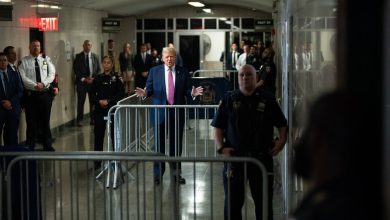U.S. to Press China to Stop Flow of Fentanyl

President Biden will press the Chinese leader Xi Jinping on Wednesday to crack down on the Chinese firms that are helping to produce fentanyl, a potent drug that has killed hundreds of thousands of Americans.
An agreement to curb China’s illicit exports of fentanyl and, particularly, the chemicals that can be combined to make the drug, could be one of the more significant achievements for the United States out of Mr. Biden and Mr. Xi’s meeting, which is taking place as leaders from Pacific nations gather for an international conference in San Francisco.
China is home to a thriving chemical industry that pumps out compounds that are made into pharmaceuticals, fragrances, textile dyes and fertilizers. Some of those same compounds can also be combined to create fentanyl, an opioid that can be 100 times as potent as morphine.
U.S. officials argue that this vast chemical industry is playing a key role in the American fentanyl crisis by supplying the bulk of materials used in illegal drug labs, including in Mexico, which is now the largest exporter of fentanyl to the United States.
The Chinese government denies that its country plays such a pivotal role and instead blames the United States for harboring a culture of drug use.
“All-out marketing by pharmaceutical companies, over-prescription by doctors, ineffective government crackdowns and the negative implications of marijuana legalization are among the combination of factors behind an ever-growing market for narcotics,” China’s foreign ministry said in a statement last year.
U.S. officials say they have stopped more fentanyl from coming into the United States in the past two years than in the previous five years combined. According to the Centers for Disease Control and Prevention, fentanyl and other synthetic opioids may have resulted in more than 77,000 overdose deaths in the United States between May 2022 and April 2023. The problem with fentanyl overdoses is particularly acute in San Francisco, where Mr. Biden and Mr. Xi are meeting.
Ian Johnson, a senior fellow for China studies at the Council on Foreign Relations, said that getting China to agree to do something about fentanyl would resonate more with average Americans than the typical “deliverables” from international meetings.
“For Biden, that would be nice to have to show to the heartland of the United States that relations with China are more than just some esoteric matter, but can actually bring something to ordinary people,” Mr. Johnson said in a briefing held by the council last week. Republicans have made fentanyl-related deaths a central piece of their campaign against Mr. Biden and Democrats in the 2024 elections.
Still, given the difficulties with policing an illicit industry, the extent to which an agreement would curb the flow of fentanyl into the United States is unclear.
Roselyn Hsueh, an associate professor of political science at Temple University, said that an agreement between Mr. Biden and Mr. Xi could lead to the Chinese central government providing more oversight and investing more resources into inspection and monitoring. But she said Beijing had run into difficulty in the past clamping down on fentanyl and precursor chemicals.
Before 2019, China was the primary source of fentanyl coming into the United States, typically through the mail and other commercial couriers. As a part of trade talks with former President Donald J. Trump, the Chinese government in 2019 agreed to prohibit the production, sale and export of all fentanyl-related drugs except through special licenses.
But that resulted in Chinese companies rerouting to Mexico, and India emerging as a new production site, Ms. Hsueh said. The main source of U.S. fentanyl became Mexican criminal organizations, which used Chinese-made components and Chinese money-laundering services.
Today, online sales that mask the identities of sellers and buyers further complicate enforcement. The regulation and enforcement of fentanyl and precursor chemicals remains “fragmented and decentralized” among Chinese local governments, industry associations and firms with vested interests in the chemical trade, Ms. Hsueh said.
U.S. officials have said that problem is compounded because many of the ingredients used to make fentanyl are legal chemicals that can be used for legitimate purposes in other industries. The United States has sanctioned dozens of people in China and Hong Kong for their role in fentanyl trafficking. In September, Mr. Biden added China to the U.S. list of the world’s major drug-producing countries, a move that the Chinese government denounced as “a malicious smear.”
Last month, the U.S. customs department released an updated strategy to combat fentanyl and synthetic drugs, including through the enhanced use of data and counterintelligence operations to track drug manufacturing and distribution networks, and target suspicious locations and recipients that demonstrate patterns of illicit activity.
“In my 30 years as a customs official, the trafficking of synthetic illicit drugs like fentanyl is one of the toughest, most daunting challenges I have ever seen,” said Troy Miller, the acting commissioner for Customs and Border Protection.
U.S. officials believe China’s dominance as a chemical producer makes Beijing’s cooperation key for enforcement. Administration officials, including Commerce Secretary Gina Raimondo, have raised the issue with top Chinese officials during recent trips to China.
When six lawmakers, including Senator Chuck Schumer, the majority leader, had a chance to talk to Mr. Xi during a visit to China last month, the main issue they brought up was not trade or military coordination or climate change, but the harm that fentanyl had caused in their home states.
“Everyone told stories, personal stories about how, you know, friends of ours, family, have died from fentanyl, and how this was a really important issue, and I think that you could tell that made an impression on him, how deeply we felt about it,” said Mr. Schumer, a New York Democrat.
Fentanyl precursors from China have become a bipartisan issue in Congress, and the six senators who spoke with Mr. Xi included three Democrats and three Republicans.
“China needs to enforce laws that prevent the export of fentanyl precursors to international drug markets,” said Senator Bill Cassidy, Republican of Louisiana.
Despite the scale of the problem, there is hope that greater coordination between the United States and China could improve the situation. Cooperation between the countries on preventing shipments of the precursor chemicals stalled several years ago after the United States sanctioned a Chinese government entity for its alleged involvement in human rights abuses in China’s westernmost region, Xinjiang.
That sanctioned entity was located at the same address in Beijing as the National Narcotics Laboratory of China, which plays a key role in China’s law enforcement effort on drug-related chemicals.
Chinese officials deeply resent American sanctions on their institutions, and U.S. officials have taken the position that because of the risk of confusion among the two institutes at the same address, neither institute can work with the United States.
China then broadened its position in August 2022 when it halted any counternarcotics coordination with the United States as one of a series of measures taken in response to a visit to Taiwan by Nancy Pelosi, then the speaker of the House. Beijing claims Taiwan, a self-ruled island democracy, as part of its territory.
Eileen Sullivan contributed reporting from Washington.



